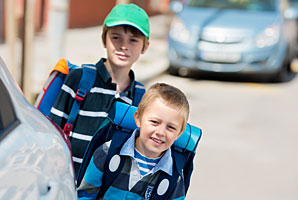Lewis Hamilton looks stressed. Not because the Formula 1 star is about to enter the decisive lap of a race, but because two girls are chatting away in the back seat of his car. This continues all the way to school, with the girls nattering so much that Hamilton's friendly expression gradually becomes more serious.
New to school, new to the road
What this Allianz UK video shows is that even the most experienced race drivers face difficulties when driving children to school. Yet the risks are not distributed evenly. Although constant racket from the back seat may send the parents' stress levels through the roof, the kids have to face very different kinds of challenges once they get out of the "mum and dad's taxi".
With the new school year starting, the Allianz Group is calling upon all parents and road users to make children's way to school safer. According to a study conducted by the EU, cycling to school is particularly dangerous. In Germany, for example, 19 per cent of all accidents involving children occurred when they were cycling. Although this value from 2010 has since decreased slightly, children under the age of 14 remain an age group particularly at risk.
Children on bikes are in particular danger
The number of cyclists and pedestrians killed across the world rose by over 60 per cent between 1990 and 2010. Children and elderly people are in particular danger. The WHO came to this conclusion as part of its Global Burden of Disease project, an analysis of causes of death on a global scale. In the list of all causes of death, traffic-related fatalities are pushing further and further ahead. From being ranked 10th in 1990, they had moved up to rank 8 by 2010, and are predicted to be 5th by 2030. Around 41 per cent of all fatalities in traffic accidents across the world are cyclists and pedestrians.
Perpetual reluctance to wear a helmet has been identified by Allianz as one of the main reasons why young cyclists are particularly at risk of suffering serious injuries in an accident. Over 40 per cent of serious cycling accidents involving cars result in serious head injuries. "The probability of suffering brain injury without a helmet is over double that for someone wearing a helmet", says Dr. Christoph Lauterwasser, head of the Allianz Center for Technology (AZT).
Regardless of age, the percentage of people in Germany who wear a helmet stands at only 11 per cent. In Austria, 33 per cent of people wear the protective head gear that could save their life. In Switzerland that number is 44 per cent, which is a start.
Put that helmet on!
Allianz urges parents to only let their children cycle with helmets on, even though there is currently no legal obligation to do so in Germany. We would also recommend: school bags with reflectors and bright clothing that stands out, for instance high visibility vests that can be worn over a jacket.
Even grown-ups can sometimes get confused on the roads. So how must the little ones feel? "Children cannot assess the traffic situation as well as adults, simply because they are physically smaller", Christian Weishuber, an AZT traffic expert, explains. Dangerous situations arise over and over again because children's field of vision is blocked, mainly by trucks and high SUVs, and because drivers themselves are only able to spot them at the very last moment. That's why it's essential for parents to not just teach their offspring how to ride a bike, but to draw attention to potential dangers and practice the route to school together more than once.
Children can benefit immensely from their parents' experience on the roads, be that as pedestrians or cyclists.

Forward Looking Statement disclaimer
As with all content published on this site, these statements are subject to our Forward Looking Statement disclaimer: